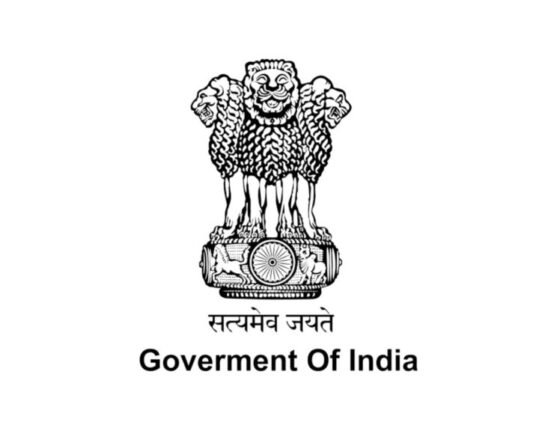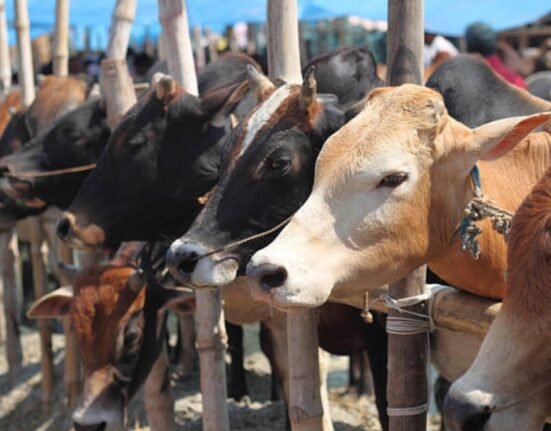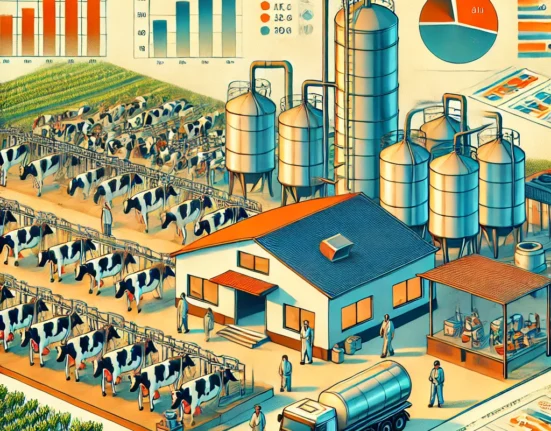A new report published by The Changing Markets Foundation and Mighty Earth finds that global supermarket chains are failing to take credible action to reduce emissions from meat and dairy—key sources of methane and climate impact in the food system.
The report warns that retailers, from Walmart to Carrefour, occupy a critical position in the supply chain but are “failing to implement measurable actions” to tackle emissions from animal agriculture.
“For retailer climate plans to be credible, they must adhere to science and set methane reduction targets of at least 30% by 2030 (from a 2020 baseline), backed by a comprehensive plan for the entire value chain,” the report noted.
Among the 20 largest global retailers surveyed, none had methane-specific targets. US chains such as Kroger and Albertsons were singled out as among the poorest performers.
Missing Methane Targets
Methane, which is over 80 times more potent than CO₂, remains a major but under-addressed driver of climate change, particularly in food and agriculture. It is emitted during enteric fermentation in livestock, manure management, and food waste decomposition. Animal agriculture alone contributes nearly two-thirds of all human-caused methane emissions, according to UN estimates.
Despite this, none of the surveyed retailers reported product-specific emissions from meat or dairy, nor did they commit to methane reduction targets—even though these products are key contributors to Scope 3 emissions, which often represent the bulk of a retailer’s climate impact.
“Addressing methane emissions is not just about reducing climate risks; it is also an opportunity for supermarkets to position themselves as leaders in the transition to a sustainable food system,” the authors added.
Only six retailers had Scope 3 emissions targets in place. Dutch multinational Ahold Delhaize leads with a 37% Scope 3 reduction target by 2030. Other relatively stronger performers include Tesco, Migros, Rewe, and Sainsbury’s, all of which have SBTi-validated FLAG targets.
Global Scores: US Retailers Lag, European Chains Lead
Using a 100-point system based on 18 criteria—including methane reduction, food waste strategy, protein diversification, and emissions transparency—only Tesco scored above 50. German and British retailers dominated the top half of the rankings:
- Tesco – 51 pts
- Schwarz Group (Lidl, Kaufland) – 35 pts
- Migros (Switzerland) – 34.5 pts
- Carrefour (France) – 34 pts
- Ahold Delhaize (Netherlands) – 33 pts
By contrast, Kroger and Walmart scored only 9.5 points, and Albertsons and Spain’s Mercadona scored zero.
The strongest-performing category was food waste, while methane mitigation, Scope 3 reporting, and alternative protein commitments remained deeply underdeveloped.
Where US Retailers Fall Short
Not a single US retailer established a clear connection between livestock-related methane emissions and climate change. Costco, Kroger, and Walmart either failed to report full Scope 3 emissions or offered incomplete data. Walmart was the only one to mention methane in the context of food waste.
The report underscores a systemic lack of regulatory push in the US, contrasting with growing climate accountability in Europe.
Only Danone, among global dairy giants, has set a science-based methane reduction target. Others, including Bel Group and Lactalis USA, disclose emissions but haven’t committed to reductions.
India’s Growing Sustainability Sensitivity – But Methane Still Missing
In India, the conversation around climate-smart food retail is beginning to take shape. Large conglomerates such as ITC, Tata Consumer Products, and Godrej Agrovet are embedding ESG practices into operations, focusing on renewable energy, packaging, and water usage. However, methane emissions from dairy and meat remain largely unaddressed, both in strategy and disclosure.
- Amul, for example, has initiated biogas programs at farmer level and continues to work on feed improvements to cut emissions, but methane is not yet a tracked or reported metric.
- Retailers such as Reliance Fresh, DMart, and BigBasket have begun exploring reusable packaging and solar-powered facilities, but Scope 3 emissions accounting—particularly for fresh and frozen animal products—is in its infancy.
Indian regulations are also evolving. SEBI’s Business Responsibility and Sustainability Reporting (BRSR) framework, now mandatory for top 1,000 listed companies, encourages—but does not yet enforce—reporting of value chain emissions or methane-specific data.
Beyond Methane: Packaging, Energy, and Executive Accountability
The report also critiques global retailers for failing to link senior executive compensation to progress on climate targets. Only Carrefour has a plant-based product sales target as part of its executive performance metrics.
There are also gaps in reporting on packaging waste, energy efficiency, and transport emissions, which collectively contribute significantly to a retailer’s overall environmental impact.
In India, startups and new-age brands are experimenting with plant-based alternatives and low-carbon logistics, but price parity and consumer awareness remain barriers. Plant-based dairy holds less than 2% volume share of India’s overall dairy market, and meat alternatives are still viewed as niche, premium products.
The Way Forward
“Reducing the meat and dairy offer to curb Scope 3 emissions should be a core strategy for every supermarket,” the report says. “By being clear and vocal with customers about the links to outsized emissions from meat and dairy products versus their plant-based counterparts, supermarkets could help consumers make more informed choices.”
For Indian retailers, this presents an opportunity to leapfrog traditional models by integrating transparency, sustainability, and science-backed climate targets early in their growth.
While global giants are still debating targets, Indian businesses have a chance to lead through innovation, ESG alignment, and value-chain transparency—but only if methane enters the mainstream sustainability conversation.







